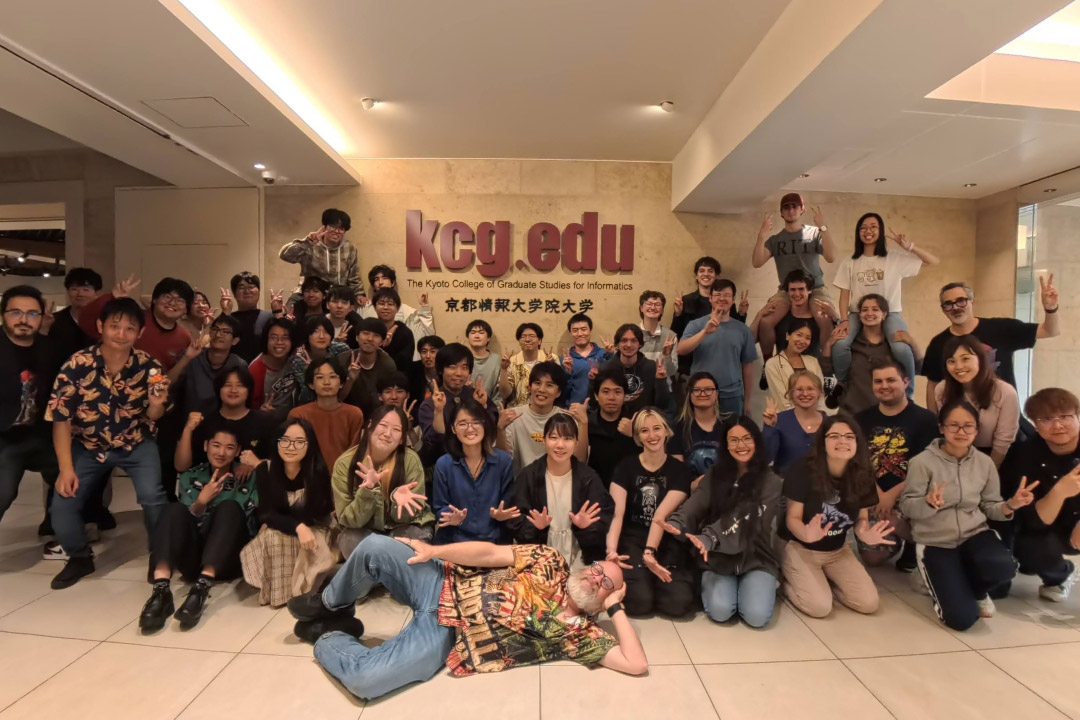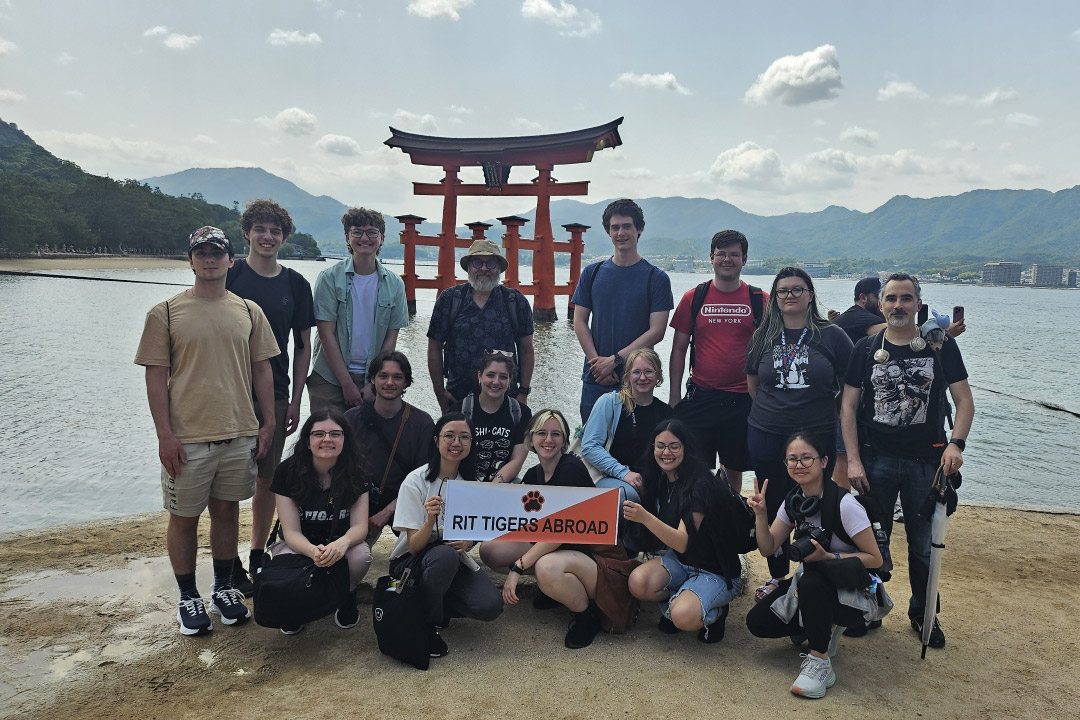Non-traditional academic shaped game partnerships, FOSS, and global collaborations

Alberto Bobadilla
Retiring Professor Stephen Jacobs, center, regularly leads a study abroad trip for RIT students to learn about game design and development in Japan. This year, he partnered with the vocational school Kyoto Computer Gakuin to run a collaborative game jam for students on the trip.
After three decades of teaching, mentoring, and pioneering academic and research programs at RIT, Professor Stephen Jacobs is retiring.
Jacobs worked as an adjunct faculty member in English and computing before becoming a full-time professor in 1995. As a video game expert, he taught courses in game programming and game design/narrative. Together with former faculty members Andy Phelps and Jeff Lasky, Jacobs wrote the proposal for RIT’s master’s degree in game design and development. Today, RIT’s games degrees are regularly ranked among the top 10 in the country.
With RIT’s MAGIC Spell Studios, Jacobs served as one of the original associate directors—focusing on industry relations. He collaborated to produce MAGIC’s first game on the Nintendo Switch platform, called The Original Mobile Games—a partnership with The Strong National Museum of Play and Second Avenue Learning.
Jacobs has also served as a steward for all things FOSS (free and open source software) at RIT. He helped create courses and programs on the subject and served as director of the Open@RIT research center.
“I’m not a traditional academic,” said Jacobs. “It’s been a pleasure to spend the last 30 years as an RIT professor.”
Below, Jacobs shares reflections from his time at RIT.
What has your long-term partnership with The Strong National Museum of Play meant to you?
I’ve been a Scholar-in-Residence since 2007. In that role, I’ve been able to serve as a member of exhibit design teams, co-create an online course in game design history that was nominated by students for an edX award as a best course, and help bring conferences to Rochester—like the upcoming 2025 Conference on BIPOC Games Studies. That kind of work, over the years, led to a Tourism Achievement Award from Visit Rochester.
We also enjoy bringing classes to The Strong every year. This year the “final exam” for my History and Design of Pinball class was to demo their analog and digital games at The Strong as part of a museum-wide pinball day we co-organized. I’ve also been working with them around my research on the Jewish History of the Toy and Games Industries in Germany and the U.S, which we’re developing into an exhibit for 2026.
Why do you champion open source for social good?
I was attracted to this world through the One Laptop Per Child initiative. They were providing low-cost laptops to children in developing countries. In 2009, I created an honors seminar for our students to make educational games for the One Laptop Per Child community.
Over 16 years that initial course grew into an immersion focusing on humanitarian open software development and an interdisciplinary minor—the only one of its kind in the world. It also led to our Open@RIT center to support faculty, staff, and students’ Open research and work. That center had us lead several workshops, join the Linux Foundation, and receive more than $1 million in awards to support its work over four years. I received the Provost’s Excellence in Faculty Mentoring Award in 2019-2020 (in part for this work) and the PI Millionaire award in 2023 for grants from the Alfred P. Sloan Foundation.

Alberto Bobadilla
Jacobs enjoys joining students on the travel-enhanced courses. This year in Japan, students immersed themselves in the culture and visited a Japanese game studio.
How have you encouraged students to make lifelong connections outside the classroom?
Video games are an international industry, and it’s important to have international experiences on your résumé.
I began teaching travel-enhanced courses—ones that meet on-campus for a semester with international travel before or after the on-campus work—in 2014. These courses established a model of spending a week in one town (in Paderborn, Germany for this one), holding a game jam over the weekend with the German students (a weekend-long, video game creating marathon), and then traveling elsewhere in country for a week to visit cultural sites and game studios. I taught this again in 2017 and 2019.
In 2018, I replicated the Germany model in Japan. We worked with Ritsumeikan University and the Kyoto Computer Gakuin, a long-time partner with RIT in international education. This year, in addition to the course’s regular visits to the CyberConnect2 video game studio and Hiroshima, we were able to attend World Expo in Osaka. As a result of this course, the vice president of CyberConnect2 and the global section chief of human resources for the company will be visiting RIT and The Strong to recruit our upcoming graduates to work in Japan and to explore the exhibits and research assets at The Strong.









